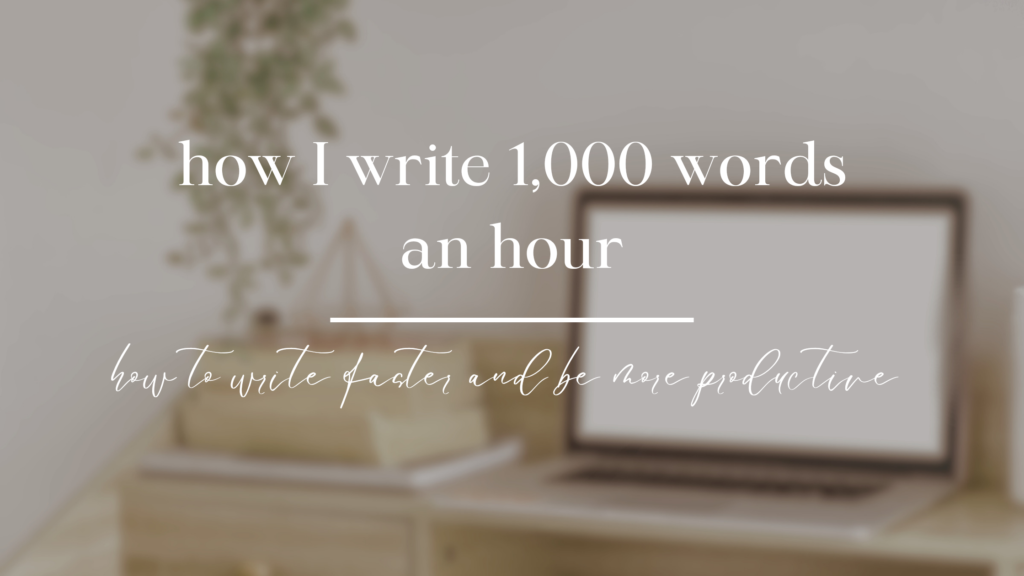
I remember the first time I considered the possibility of writing thousands of words a day. It was a thrilling thought to a lover of productivity like myself. It was amazing to think that that was even possible.
But now, many, many writing sessions later, I know through personal experience that writing hundreds or even thousands of words a day is possible and you don’t have to be a super experienced or skilled writer to enjoy massive productivity when you write.
my process + a disclaimer
Before I tell you how I learned how to write faster, I want to give a disclaimer.
I don’t write 1,000 words an hour all the time. Sometimes I write slower and there have been times when I’ve written faster. But 1,000 words an hour is my average.
When I first read about writing thousands of words a day, it was in a lesson on The Young Writers Workshop. It was called, Who Else Wants To Write Thousands Of Words Every Day, and written by Paris Hansch. I was mentally raising my hand as high as it could go. “Me! I want to!”
I read the lesson very curiously, wanting to know how on earth someone could reach this level of productivity. The answer was simple and seemed obvious, though not intuitive. Paris shared her journey of how she was able to write so much everyday and then provided students with a framework to follow.
Since reading that lesson, I haven’t followed Paris’ framework perfectly or all the time, but I’ve applied the principle to my life and seen amazing results.
I wasn’t always able to write as much as I can now. I wasn’t always able to sit down almost every day and make consistent progress on my writing projects.
Here’s what I learned from Paris, along with a few other things that I have found to help me have the best, most productive writing sessions possible.
1. Be consistent over time
The main message of Paris’ lesson was that building a consistent writing habit is the key to being able to write faster. You can’t get good at something and be able to do it quickly when you only do it once and a while. The more you write and the more consistent you are, the easier it will be and the faster you’ll be able to write.
Writing, as you’ve probably heard before, is like a muscle. You can’t neglect to work out and then expect to be able to win a race whenever you get a whim to enter one. You just can’t expect your body to work that way.
Well, it’s the same with writing and your “writing muscles”, which include a few things, I think: creativity, imagination, and your discipline. All three of these things need to be “in training” in order for you to be able to reasonably expect top performance from them.
If you have been exercising your creativity everyday for the last 2 weeks, it’s reasonable to expect that you’ll have little trouble exercising it today. The same goes for your imagination and your discipline.
One thing to keep in mind is that you don’t have to start out writing massive amounts of words to build a writing habit. Paris says that she started out writing just 250 words a day and slowly–over the course of months—worked her way up to higher numbers. Your writing habit doesn’t have to start out looking big and impressive. What’s big and impressive is that you’re staying consistent and showing up for yourself. Focus on being proud of that, and you’ll be motivated to stay consistent, which will help you to make even more progress.
Because, once you have built a consistent writing habit, you may not see the results of that habit unless you maintain the habit over time. If you’ve written everyday for the last week, that’s great and you should be so proud of yourself (really, you should!), but don’t be discouraged just because you still aren’t writing as fast as you want to. Like Kara Swanson Matsumoto has said, “writing is a marathon, not a spring.”
But the nice thing about a habit is that as long as you are consistently putting in time and effort, you can know that you are making progress even if you can’t see it yet.
It takes time to build up writing speed. It’s a muscle. Sometimes you have to build up repetition before you see any results, but you will see progress. Just keep writing every day. You will see progress, and you’ll be so proud of yourself and so glad that you had the determination to stay consistent even when it was hard.
2. Be aware of your mental energy levels
Everything is harder when we’re tired, right?
Writing, since it’s such a mental activity, can be extremely draining and if you go into a session already feeling drained, it can be very hard to write fast. It can be hard to write at all.
So if your mental energy is low, don’t expect yourself to write at top speed. It’s okay to not perform at your highest rate when you’re tired.
But if you want to have a very productive writing session and you’re not so tired that it will take a long time to recover, I recommend trying to refill your creative well as much as you can before you start writing. Writing from a state of mental nourishment is so much more satisfying than scraping from the bottom of the barrel, though I know that’s necessary sometimes.
Here are a few things that I do to refill my creative well…(FYI, I don’t do these all at the same time.)
- Listen to music
- Have a snack
- Watch some of my favorite creators on Youtube or Instagram
- Take a walk and really try to let nature around me sink into me
3. Have a rough mental image of what happens next in your project
I have found it very helpful to write a few lines about what I think should happen next in my story at the end of a writing session so that when I come back, I don’t have to first brainstorm. When I end a writing session, I am also ending a train of thought, and leaving myself an idea of where to start next time is like dog-earring the end of a roll of tape—I’m giving myself something to grab onto the next time I write.
This can also be applied to non-fiction. Instead of completely cutting off the flow of your ideas when you stop writing, leave a little of that inspiration for next time. Your future self will thank you!
4. Relax
Tension is the enemy of creativity. When I’m tense, it’s harder to think clearly, my imagination feels stunted, and writing ceases to feel enjoyable.
There are many reasons to feel tense, some that may have nothing to do with your writing, but I would suggest taking a few moments before you start writing to decompress and get into more of a relaxed, fluid state.
You could try:
- Writing down what’s making you feel worried
- Taking a short walk and letting the wind and sunshine (if the sun is out) brush away some of the weight on your mind
- Treating yourself to a favorite snack, drink, or song.
- Praying and telling everything to God—he’s your refuge (Psalm 46:1)
A line I thought while brainstorming this point was, “you can’t dance when you’re tense”, and while I’m not a dancer, I’m sure it’s much harder—if not impossible—to dance gracefully and easily when your muscles are tense.
Writing is like making words dance, and it’s much easier to do when you’re relaxed.
5. Call in “God Power”
God is the best author in the world. His book has outsold every other published work. He knows what he’s doing.
And he cares about you.
He says, Call unto me, and I will answer thee, and show thee great and mighty things, which thou knowest not (Jeremiah 33:3). He also says that he is our helper (Psalm 33:20).
I have experienced wonderful things when I have asked God to help me with my writing. He is ready to keep his word.
So include him in your process. Talk to him about what’s hard for you when you write. If you want to write faster, ask him to help you learn how. He’s more than ready to teach you what you need to know (Psalm 32:8).
Writing faster is all about how you set yourself up for success. Are you being consistent, are you aware of your mental energy levels and making sure you don’t push yourself when you know you’re running low, are you taking advantage of your train of thought and leaving a few ideas for your future self to run with, are you relaxing, are you taking advantage of the fact you live with the greatest writer of all time (literally)?
If you do all these things, I can guarantee that you will begin to write faster. And you’ll probably enjoy writing so much more. Writing faster is just a by-product of the right systems and habits. You will get there, my friend!





4 Comments
This is such a great post! That third point especially is something that I bet will really help me in the future…I’m going to try that!
I’m so glad, Leah!
Your commitment to work-life balance is something we all strive for. Your tips on finding harmony in a busy world are much appreciated.
Thank you so much!
Comments are closed.